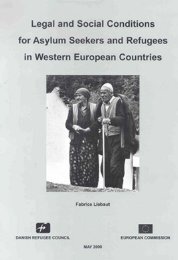Bulgaria - The social impact of seasonal migration
Bulgaria - The social impact of seasonal migration
Bulgaria - The social impact of seasonal migration
You also want an ePaper? Increase the reach of your titles
YUMPU automatically turns print PDFs into web optimized ePapers that Google loves.
However, in the case <strong>of</strong> Kal<strong>of</strong>er, money from work abroad was, indeed, used for starting up<br />
small enterprises. Kal<strong>of</strong>er is a small town, with 4 000 inhabitants, situated in Central<br />
<strong>Bulgaria</strong>. It was a famous manufacture and cultural centre during the <strong>Bulgaria</strong>n Revival<br />
in the nineteenth century, and during the Communist regime there were two<br />
enterprises, related to the military industry developed in the region. Now, after a long<br />
period <strong>of</strong> inactivity, one <strong>of</strong> the enterprises has been privatised, while the other is still<br />
state-owned and the salaries are not paid regularly. So, the inhabitants <strong>of</strong> Kal<strong>of</strong>er started<br />
looking around for strategies that would help them cope with the situation, with<br />
<strong>migration</strong> becoming one <strong>of</strong> the most popular <strong>of</strong> them. <strong>The</strong>re are no statistical data about<br />
<strong>migration</strong> from Kal<strong>of</strong>er, but an in-depth inquiry had revealed that a lot <strong>of</strong> people, mostly<br />
women, are going for <strong>seasonal</strong> work abroad – either in Greece for picking oranges, or in<br />
Spain and Germany as baby-sitters, cleaning ladies and housekeepers. Usually this<br />
<strong>migration</strong> is <strong>seasonal</strong>, but some <strong>of</strong> the migrants are staying longer. After returning home,<br />
most <strong>of</strong> them start up private businesses. All the pubs and cafes in the town are owned<br />
by people who had been working abroad. A young family couple, who has picked<br />
oranges in Greece for two consecutive summers, has accumulated enough money and<br />
has now started a private business, first opening up <strong>of</strong> a shop and now developing <strong>of</strong> an<br />
aluminium joinery workshop. <strong>The</strong> couple recounted that the months spent in Greece<br />
were one <strong>of</strong> the most horrible in their whole life, with working for 11-13 hours a day<br />
under the burning sun, living in terrible conditions – 20 persons in a hot and dirty<br />
barrack, and with practically no rest. Yet one <strong>of</strong> the spouses also admitted that “in spite<br />
<strong>of</strong> all the troubles, work in Greece was a good start for our business, I could not manage<br />
to open it up with these salaries here. And what I learned from our work there was that<br />
the best thing in the world is to be your own master rather than to work for other masters<br />
– be they the state or [private] employers” (interview N 22).<br />
It turns out that it is not the money and the specific know-how which is the most significant<br />
“import”, but the cultural lessons related to a new organisation <strong>of</strong> work and life that produces<br />
a new worldview (Weltanschauung). Here is a part <strong>of</strong> the interview with a 53 year old<br />
woman from Kal<strong>of</strong>er: “I have worked in Greece for 8 months and when I came back here I<br />
realised that the most important thing I had earned was not the money - actually it was not<br />
so much - but the very stay and work there that had changed me. In Greece I understood<br />
that here in <strong>Bulgaria</strong> we are still living with our <strong>social</strong>ist mentality, waiting something to<br />
happen to us, and not struggling for achieving it. In Greece I learned how to be active and<br />
combinative in order to survive. And also how to be strict and responsible - no delays, no<br />
explanations – if you have to do something you have to do it. I understood that I had to take<br />
control <strong>of</strong> my life, to be more enterprising and inventive. So, when I returned from Greece<br />
I was a different person. And I started to think what I shall do in order not to be dependent<br />
only on my salary. <strong>The</strong>n a person from the <strong>Bulgaria</strong>n Association <strong>of</strong> Alternative Tourism<br />
came here in order to look for houses appropriate for alternative mountain tourism. And I<br />
said to myself – that is it, why do I have to work for this Zig Zag tourist firm, when we can<br />
develop our own tourist business” (interview No. 20).<br />
<strong>The</strong> two different cases, in Kirkovo municipality and in Kal<strong>of</strong>er, require further research<br />
and analysis in order to explain why there was no strong cultural <strong>impact</strong> upon attitudes<br />
and behaviour in the former one, whereas in the second, things went in the opposite<br />
direction. What is common to both cases, though, is the strong western influence upon<br />
local consumer practices.<br />
51

















